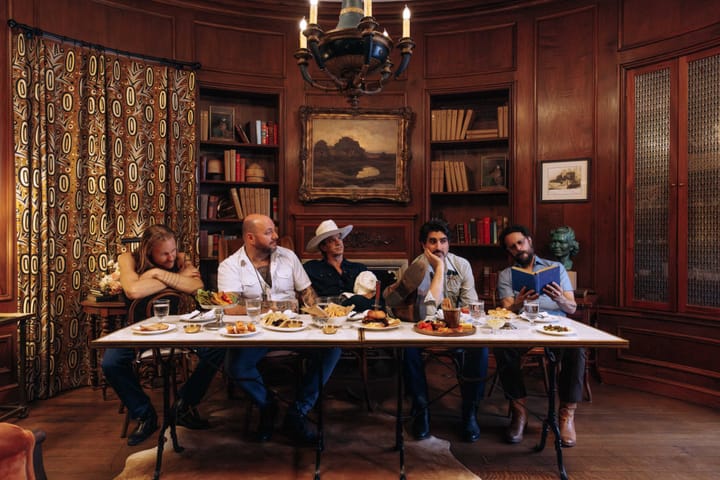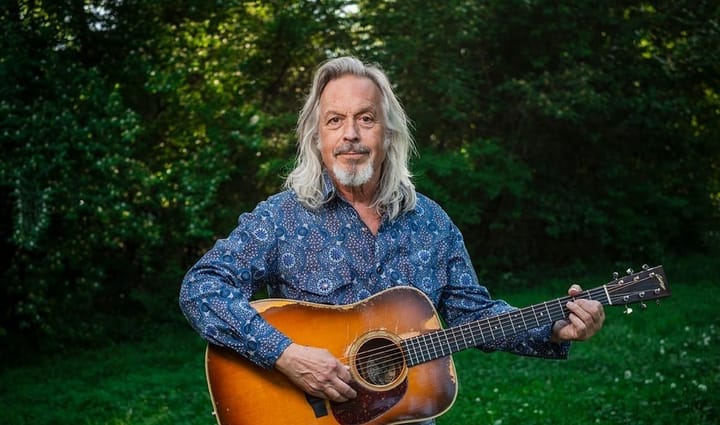In pondering the uniqueness of Robert Earl Keen, let's compare him with his fellow Texan Lyle Lovett. College buddies and fellow Aggies, the two co-wrote "The Front Porch Song", which each recorded early in their careers. They shared a circle of formative acquaintance and influence on the Houston/Austin axis, one that encompassed the likes of Nanci Griffith and Eric Taylor while idolizing Townes Van Zandt and Guy Clark. They share a deadpan sense of humor and a polite manner toward strangers. They share vocal harmonies on the chorus of "That Buckin' Song" from Keen's new album Walking Distance -- one of the goofier songs Keen has ever penned, allowing him to indulge in all sorts of "motherbuckin'" wordplay.
In terms of concert atmosphere, however, Lovett and Keen are about as much alike as a chamber recital and all-star wrestling, or chardonnay and Shiner Bock. The sensibility gap between Lovett's crowd and Keen's is almost as wide as the generation gap.
"Lyle came to about three shows last year and just freaked out. He said, 'Man what's the deal? Those people are really young!'" recalled Keen with a laugh as we spent a sunny afternoon in his office in downtown Bandera. It's a couple hours of gorgeous Hill Country drive southwest of Austin, a cowboy hamlet where there are more bars than churches and more guitars than anything resembling industry. The sign on the one-story stone building reads W. Preston Gray, Real Estate Etc. Gray is Keen's father-in-law and Keen is the "Etc.," though, to hear him tell it, the building is a whole lot busier with Keen's booming business than real-estate business.
Anyway, back to Lyle: "I mean, his audience is like our age (in other words, fortysomethings), and a lot of them are sophisticated and have a lot of money and love music and all that stuff, but it's not the gutbucket of America coming to his shows," continued Keen. "Shoot, I don't think anybody gets drunk at one of his shows."
At Keen's shows, it seems, everybody gets drunk, or puts on a pretty good act to that effect. It started as something of an Aggie phenomenon, with frat boys and alumni from Texas A&M turning Keen's concerts into a raucous revel of political incorrectness, hooting along at the treachery of "The Road Goes On Forever", cheering the bloodshed of "Whenever Kindness Fails", sharing the singalong tenderness of "It's The Little Things" ("that piss me off"), hungering for "Barbecue".
Initially, Keen's yahoo effect seemed like a Texas phenomenon, but he has since proven capable of bringing out the Aggie in the rest of America as well. There's a ritual at some of the more boisterous Keen performances: A bunch of guys keep ordering rounds of beer until their table is filled with empty longnecks. Then they tip the table, sending the empties crashing to the floor, and start filling it all over again.
"We sell more beer at our shows than anybody else does anywhere," said Keen, the pride in his voice mixed with just the slightest twinge of remorse. "Oh, man, it's just nuts. We go to places and they sell out of beer. It's just like, let's go get drunk and watch Robert Earl Keen. What we're bringing to the party is this party atmosphere, and there are quite a few references to being drunk and disorderly in my songs, so I guess that's where they get that. Probably the number-one remark I get in fan mail or from people talking to me after shows is, 'My buddies and I like to get really drunk and sit around and play your songs.' It's always, 'really drunk.' Whatever. I'm glad."
If he doesn't sound glad, or at least not unconditionally so, it's because Keen takes both his writing and his career very seriously. Whatever happy-go-lucky response he elicits, there's a lot more to his music than the "party hearty" atmosphere his concerts evoke. After all those years of scuffling to the point where he practically gave up, he isn't about to resist the embrace of an audience -- any audience -- yet he's capable of a lot more range and subtlety then one might ever suspect from his shows. He has seen what happened with Jerry Jeff Walker, who also once fancied himself a serious songwriter, before allowing himself to become a caricature to his audience, and then its prisoner.
"It certainly is something that I worry about," said Keen. "If I have one true gift, it's actually writing narrative rhyming poetry. I'm not any good at prose, I'm not a great philosophical sort of writer, but I write really good narrative poetry. And some of it is serious. If I'm just known for the Christmas stuff ['Merry Christmas From The Family' and the new album's boozy sequel, 'Happy Holidays, Y'all'] and 'The Road Goes On Forever' and 'The Five Pound Bass', that's a mighty small place to live in as far as where I want to live as a writer."
Thus, his albums claim a more expansive piece of artistic territory, as titles such as A Bigger Piece Of Sky and Walking Distance suggest. The new album is both Keen's most organic and one of his more thoughtfully ambitious, a thematic song cycle inspired by his life in Bandera, concluding with a mini-suite that he says was sparked by Willie Nelson's Phases And Stages. As such, the album represents a turnabout from last year's Picnic, in which Keen avoided any stereotypical Texas reference in his bid for a wider audience.
"The last time, I felt like, 'Well, I'm signed with Arista, I have this worldwide connection here, and maybe some things that limit me are just particular regional references,'" explained Keen, who recorded Picnic in Athens, Georgia, with producer John Keane and an aim of concocting an edgier, guitar-driven sound that would be more alternative, less country. The album sold a respectable 65,000, but that was a disappointment for Keen in comparison with the 100,000 or so sold by his previous year's live album for Sugar Hill, No. 2 Live Dinner.
"I thought in some ways, I made the perfect compromise -- I didn't make anybody happy," he said with a laugh. "The reviews were nice enough -- hey, this guy's trying something new, and some of it works and some of it doesn't work so well -- but that record was jagged. I like some of the songs on Picnic a lot, but when I listen to it from front to back, it doesn't fly. It doesn't feel like it's one thing."
This time through, the album felt naturally cohesive with every step. Keen wrote all of his material in a couple of weeks at home during the late spring, and sequenced the album in pretty much the same order it was written. He recorded in Austin with his regular band and co-producer Gurf Morlix (late of Lucinda Williams' band, and a player on Keen's two previous albums). He was determined to avoid a repeat of his previous recording experience.
"It was like night and day," he said. "When I went to Athens, I was really afraid, because I didn't know anybody, and I didn't know John. So we go there, and it was just so friggin' intense, and you were scared you were going to make a mistake. John is a good guy, but he is a humorless guy, and I don't think I ever saw him laugh the whole time. At one point, my mouth broke out with some kind of ulcers and I had to go to the hospital, I was just so stressed out.
"Now, when we get to Austin, it's Gurf -- Mr. 'Hey Dude, Whatever.' But a real professional, real pro -- he kept things rolling and you never felt like you were working. And I love the way he plays; he has that really big, fat electric guitar sound. He plays like he talks, very little. When he talks, you listen to him, and when he plays, you listen to him."
If Walking Distance makes Keen sound comfortably settled in Bandera, enjoying the life he shares with his wife Kathleen (with whom he manages his career) and four-year-old daughter Clara Rose, the path he took to get there was as strange and circuitous as any you'll find in a Robert Earl Keen song. After graduating from Texas A&M in 1980 with a degree in English, he initially got a job with the state's Railroad Commission when he moved to Austin, and pursued music only as a sidelight. "I kind of secretly wanted to play music, but I never did come out and tell my parents; I didn't have that kind of confidence," he explained. "And then I kind of grew into it. I wasn't making any money, but I was opening for a lot of my heroes, like Townes and Guy and Loudon Wainwright."
Later that year, Keen had developed enough confidence to move to Nashville and try to hawk his songs. At a time when country music was floundering commercially, the city was uncharacteristically receptive to all sorts of creative renegades, with fellow Texans such as Lovett, Griffith, Darden Smith, Joe Ely and Steve Earle all making inroads. It was Earle, in fact, who counseled Keen to leave Austin, because, as Keen remembers it (in the same words Earle has been known to utter), "Austin had such a manana attitude. There were too many pretty girls and too much cheap dope in Austin."
Expecting the doors to open as easily for him in Nashville as they had for his buddies, Keen was surprised to find them slammed shut. Whatever it was that he was selling, Nashville wasn't buying.
"If you're going to present some music to them, it had better be something that either they really understand, or something they recognize as great, like Lyle, but don't understand," he said. "What I was doing they recognized as kind of quaint. My favorite euphemism they use in Nashville is 'intelligent lyrics.' The first time I ever saw that was in a review of No Kinda Dancer (his self-financed 1984 debut) in Billboard, and I thought it was kind of cool. And then over the years I realized it was like a secret code in Nashville: 'You don't want to mess with this guy. This is going nowhere. These songs are not meant for radio.'
"I was on the same bill as Darden at a downtown thing, and I sat next to his A&R person, and she was writing notes on everybody. She got up, and I looked over, and it said, 'Robert Something Keen -- this guy's Jerry Jeff, Billy Joe Shaver, same old shit."
Keen eventually got the message and decided to return to Texas, where wife Kathleen had been paying the bills by working in Bandera at a nursing home her parents owned there. Keen harbored no ambitions about launching a musical career from such an isolated outpost. As a city kid from Houston who had failed in Nashville, he looked at Bandera as more like a last resort.
"I thought my career was over, and I didn't know what I was going to do in Bandera, Texas," he said. "At first it was like it's the moon out there, because there's no grass. I'd work construction and make a few bucks here and there, but all the time I was thinking I had to find a career. I got really whipped and remember just sitting for a month, doing nothing. And then I started writing songs again and that kind of brought me around. I realized that I'd been writing these fake songs and trying to pass them off in Nashville, because I thought maybe that was the kind of song they wanted to hear."
With 1989's West Textures, Keen's writing came into its own. "The Road Goes On Forever" gave him a signature tune; "Mariano" and "Love's A Word I Never Throw Around" showed his ability to hit deeper with more serious fare. In "Leavin' Tennessee", he gave a belated kiss-off to the Nashville experience that had almost soured him on music forever.
After playing clubs as a solo act and opening concerts for Van Zandt and Clark, he started developing a reputation in the '90s as a live-wire performer, a guy with a reckless edge of unpredictability. Once 1993's A Bigger Piece Of Sky began to receive some Texas airplay, he formed a band to play over the noise of the bigger joints necessary to accommodate his audience. From his base in Bandera, he and Kathleen started running a fan club and producing a newsletter that now has a mailing of 8,000. Along the way, he decided to stop billing himself as Robert Earl Keen Jr., figuring that even folks who had learned to accept three names from Texans might be having some trouble with four.
Then came Joe Ely's recordings of "The Road Goes On Forever" and "Whenever Kindness Fails" on his 1992 album Love And Danger, giving a critical boost to Keen's roadhouse credibility. Even bigger, in terms of mainstream exposure, was the inclusion of "The Road Goes On Forever" as the title track of the 1995 album by the Highwaymen, the supergroup featuring Willie Nelson, Waylon Jennings, Johnny Cash and Kris Kristofferson. Against all expectations, what hadn't worked in Nashville turned into a thriving cottage industry in Bandera, with the Keens employing almost a dozen folks (including the band) to keep the Robert Earl Show on the road.
"I guess I'm ambitious without focus," said Keen. "I've always wanted to get to a larger audience, because I want to keep this thing going. I mean, I don't want another job. I wish I could go back and learn more about music, be more musical than I am, but the whole thing's kind of caught up in this big tidal wave right now. I want my shot at playing as big a things as I can play, and so far I've been too cocky to say I've hit my limit.
"Of course, I haven't played the rodeo in Houston, Texas, but my booking agent knows I'd take that without even calling me. And you know that would be a miserable situation: You can't hear worth a shit and nobody can hear half the songs, but the idea of playing to 60,000 people is that good."
With a band that features Keen's boyhood buddy Bryan Duckworth on fiddle and Austin virtuoso Rich Brotherton on guitar, his performance has all the musical firepower it needs. With recent material such as "My New Life In Old Mexico" and "That Buckin' Song" likely to join mainstays such as "The Road Goes On Forever" and "Copenhagen" as rabble-rousing highlights, his audience is likely to grow wherever cold beer warms a Saturday night.
If there's a limit to Keen's popular potential, it likely lies in his singing, since his flat, nasal range will never be timbre for Caruso's. On Picnic, his delivery sounded all the more wooden in comparison with the Cowboy Junkies' Margo Timmins, who shared vocals on five of the album's cuts.
"I worry about that all the time," he said of his singing, which is more supple on Walking Distance. "I think I sing better when I'm surrounded by acoustic instruments and not so much heavy-hitting stuff. Now John Keane was a good coach, and he really hears things very well, but it got to the point where I was really nervous and self-conscious about it, and felt like I was losing some of my weirdness or sloppiness or whatever it is I do. Where Gurf would just say, 'It sounds good.'"
Knowing his limits, Keen tends to record material by others who have similar vocal ranges -- Terry Allen, James McMurtry, Dave Alvin. "I just pick songs that I really like from other people, and generally they're kind of singers like I am," explained Keen, who covers "Travelin' Light" by Peter Case and Bob Neuwirth and "Billy Gray" by Norman Blake on Walking Distance. "I like those peoples' voices, and it's just kind of a nod to the art or the craft. This is a song I'd write if I could."
Maybe part of the key to Keen's appeal -- whether he's revving his way down Allen's "Amarillo Highway" or leading the holiday serenade of "Merry Christmas From Fhe Family" -- is that the more you drink, the better he sounds. And the younger you are, the less you care.
"I have never, ever stood in front of a 60-year-old rancher in a white shirt and khakis and a straw cowboy hat and gone anything but, 'I bet this old man thinks I sing like shit,'" he said with a self-deprecating laugh. "It drives me crazy, but I'm just glad that all his kids don't seem to mind."
Don McLeese always rides home from the Robert Earl Show with a designated driver.




Comments ()